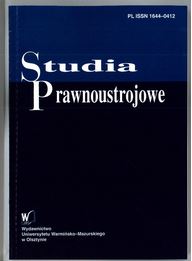Klauzula czynnego żalu i przerwanie solidarności sprawców przestępstwa korupcji wyborczej
Active repentance clause and breaking of the solidarity of perpetrators committing the offence of electoral corruption
Author(s): Marcin Berent, Waldemar KurkowskiSubject(s): Criminal Law, Electoral systems, Corruption - Transparency - Anti-Corruption
Published by: Wydawnictwo Uniwersytetu Warmińsko-Mazurskiego w Olsztynie
Keywords: criminal law; electoral law; active electoral corruption (vote-buying); passive electoral corruption (electoral bribery); active repentance;
Summary/Abstract: From the quantitative point of view, offences against elections and referenda are on the margins of the total number of offences recorded annually in Poland. However, they are characterized by a unique particularity revealing temporal, seasonal dynamics, and a distinctive motivation of perpetrators, including those accepting (demanding) an advantage in exchange for a certain way of voting (vote buying) and those providing such an advantage (bribery). A limited number of offences committed does not necessarily indicate a lack of judicial dysfunction in the operation of the justice system, especially if the reduction in the number of offences is not the result of the state criminal policy. The truth of this thesis seems to be particularly relevant in the case of the offence of electoral corruption (Article 250a of the Criminal Code) since its commission always constitutes a manifestation of criminal pathology that distorts the actual outcome of elections, and consequently, the value of the entire electoral process and even of democracy in general. For these reasons and despite the limited extent of electoral corruption, legal interests underlying it remain of the highest value. The paper addresses these very issues. It includes dogmatic, theoretical and legal research and analysis of the title active repentance referred to in Article 250a § 4 of the Criminal Code, established, under the legislator’s intention, to break the solidarity between perpetrators of corruption in the area of electoral corruption. The purpose is to present the normative basis of the institution, which, after all, is of major importance for shaping the criminal liability of an individual perpetrator, but also, despite the small number of electoral offences, for conducting the entire criminal policy of the state. However, the aim of the article is not limited to descriptive analyses, because the research and analysis of the selected type of prohibited activities are not limited to considerations conducted through a purely dogmatic prism, but includes a research aspect that relies on the presentation of research results of an empirical nature. The deliberations, which are based on lex ferenda and partially on de lege lata considerations, focus heavily on the analysis of the institution of active repentance as described in Article 250a § 4 of the Criminal Code. This institution provides that the perpetrator may count on the modification of the scope of liability, including waiving the punishment if they abandon their criminal intent and no longer wish for the act to happen. Ultimately, this paper does not deal only with dogmatics focused around Article 250a of the Criminal Code and involving a purely descriptive approach. It also addresses the title breaking of the solidarity of the perpetrators committing the offence of electoral corruption and the empirical research that the authors have presented in this study.
Journal: Studia Prawnoustrojowe
- Issue Year: 2021
- Issue No: 54
- Page Range: 21-33
- Page Count: 14
- Language: Polish

